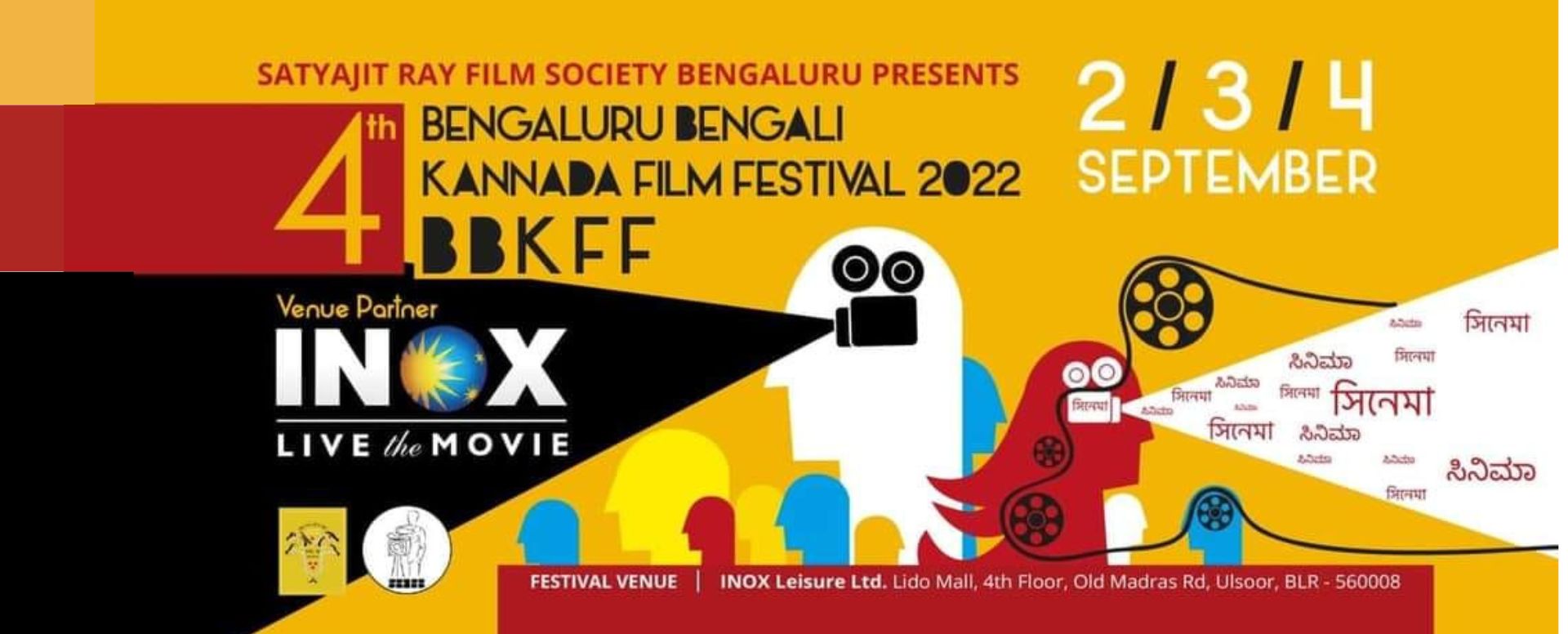
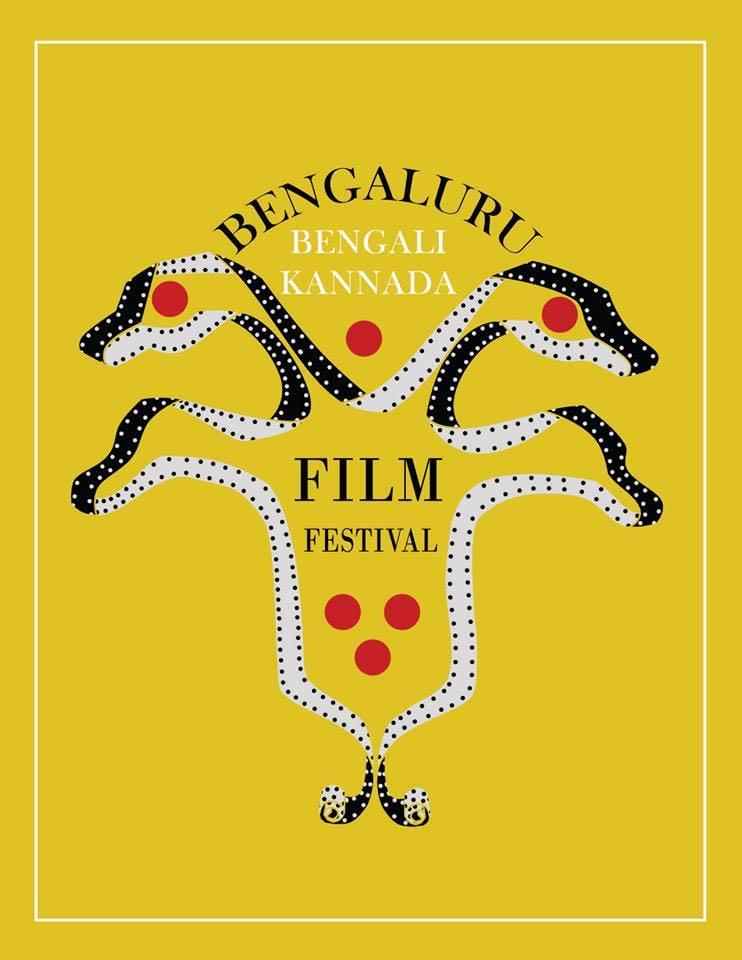
It started with a lot of dreams in 2017, when we organized the first Bengaluru Bengali Kannada Film Festival. The initial thought was to bring the best of Bengali Cinema available to the Bengali crowd here in Bangalore. But then, as often it happens that a simple thought goes through a journey and becomes something much bigger than what it initially was, something similar happened with us as well. It became a Bengali Kannada Film Festival, rather than a Bengali Film Festival, and yes, we screen Kannada cinema as well.
And now, after 5 years, we are a registered Film Society, are 3 film festivals old (2017, 2018 and 2019), having screened about 50 films across 6 languages – Bengali, Kannada, Hindi, Telugu, Odia, Malayalam, panel discussions on milestone cinema and legendary directors and their work, discussion sessions with esteemed filmmakers, actors, producers, and a lot of fun in all of this.
This film festival has enabled the viewers to be part of unique cultural exchanges and develop a taste for multi-lingual cinemas. The past three editions of BBKFF received overwhelming response from the audiences from Bengaluru, cutting across various communities. This festival has been recognized for its high standards by renowned films scholars and stalwarts from various Government and non-Government Film Federations of India.
After a hiatus of two years, the 4th edition BBKFF will be held on 2nd, 3rd and 4th September, 2022 at
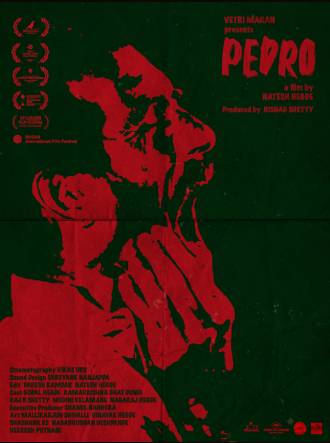
Pedro is a middle-aged electrician living with his mother and his brother’s family in a remote village nestled in the thick forests of the Western Ghats. One monsoon night accidentally kills a cow that belongs to his landlord Hegde. Sensing trouble, Pedro leaves town. Hell breaks loose in the village.
Filled with anxiety, Pedro has no way but to return. He ultimately joins his former employer Raju, mending power lines in the forest. The village, unable to accept a man who’s committed the disgraceful act, responds with coldness.
Director: Natesh Hegde
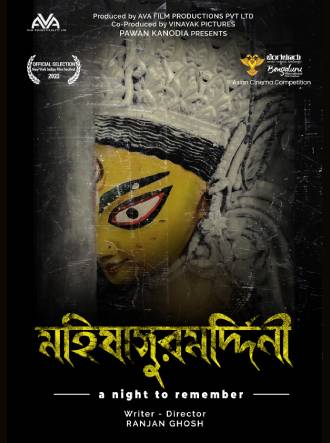
UNESCO has included Kolkata’s Durga Puja in its list of Intangible Cultural Heritage of Humanity. Goddess Durga is also known as Mahishasur Marddini. A ten-year-old deaf-mute destitute girl is gang-raped and murdered on the first night of Durga puja. She happened to spend her days and nights at the local Hindu crematorium and Muslim graveyard, not very far from the city. The story shifts to the house of a landlady and her four college-going tenants busy with last-minute festival preparations. Hearing faint wails from their backyard, they rush out to find a newborn female infant dumped outside in a garbage bin. They rescue the baby. Through the night, they receive a few guests, some expected, some unexpected. The incidents that unfold thereafter reveal the trials and tribulations faced by women all over, with a realization that a girl-child in distress is actually humanity in peril. It is a shame that the land that worships the Mother Goddess with so much fanfare can’t protect its daughters. ‘Mahishasur Marddini’ is a letter of apology to women for the wrongs done to her through the ages that continue even to this day.
Director: Ranjan Ghosh
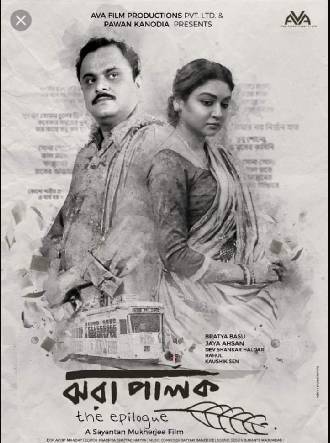
The film “Jhora Palok ” followed the voice of poet Jibanananda Das and tried to capture his life through the imaginary visual representation the way he was intrigued with his poetry and explored his life in his own means. The film continuously tries to explore euphorically by transcendental means, his transformations of the self to be the poet with excellence as subject from his childhood to his death periodically, and the growth of his poetic conscience through the time and their consequences. From his very childhood he struggled to fit in the society but failed to do so and the film attempts through the interpretation of the repertoire of his works and his interaction with the so called society of intellectuals and how he get accomplished his position as a poet in Bengali literary scene of coming future which are also present in contemporary time.
Director: Sayantan Mukherjee
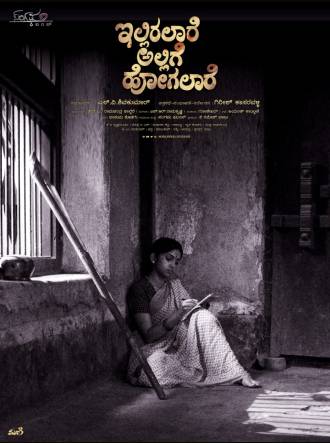
Set in two time frames, The India of the 60s and the India of the new millennium, “Illiralaare Akllige Hoogalaare” tells the story of the challenges faced by the two boys who dream of getting out of their oppressive and suffocating lives. These two boys are a mirror image of one another.While one dreams of moving to the city, the dreams of the boy in the city are different. What was their search in life? The contrasts and contradictions in their dreams form the crux of the story. Young Naga lives in a countryside which is idyllic and serene. But the living conditions are oppressive and suffocating. He runs away to the city hoping for better living conditions. Punda is working as a domestic help in the city. But the city of the new millennium offers him comforts but not happiness. What were their search in life?
Director: Girish Kasaravalli
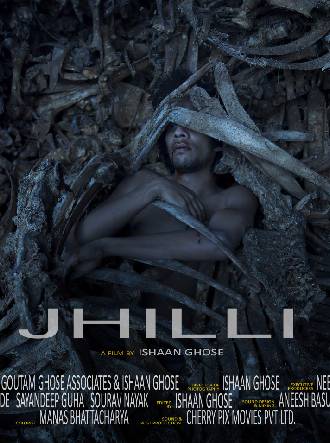
Bokul, a fourth generation manual labour worker, works in a bone crushing factory in the middle of Kolkata’s largest dump yard. He is oblivious to his struggles and makes the best of his life in his world. Unbeknownst to him, the world outside is rapidly changing and making space for a new economic boom. His world being traded for a recreational park.
Director: Ishaan Ghose
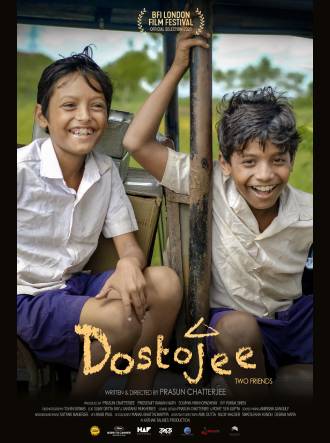
The aftermath of Babri Mosque demolition and the Bombay blasts in India, 1992-93, found its violent echoes even in a remote village of West Bengal adjacent to the India-Bangladesh border where the story begins to unfold. A story of friendship between two little boys belonging to two warring religious communities. Palash (8) is the son of a Hindu Brahmin while Safikul (8) is the son of a Muslim weaver. The innocence of Palash and Safikul receives its sustenance from nature. The greenery of the village, the river and the vast stretch of paddy fields playfully rebound the echoes of the voices and the laughter of the boys. However, relentless fate arrives quietly, when separation becomes the destiny of their friendship. How do the boys face the farewell and spread wings to fly again?
Director: Prasun Chatterjee
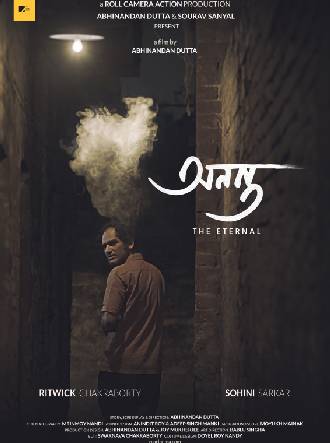
The indifferent, lonely man in his early 40s is unambitious and jobless. A lonely woman in her 30s is a school teacher. Both are middle class.
They both meet every day in a particular hour. When the light comes in from the window of an old staircase from 2.57 p.m. to 4.00 p.m. It is the spot of their regular rendezvous.
He waits for her every day at that staircase. She comes. They talk about themselves, share their dreams, unspoken hopes—little bits of themselves. He likes her. She likes him.
And this is all he wants, the sole ambition he has—to meet her at the staircase, every day, forever.
But she is going to marry someone else soon. Because they never meet in real time.
One day everything disappears. He has been waiting for her since, in his dream and reality, forever.
The Man is Suvo.
The Woman is Mistu.
Director: Abhinandan Dutta
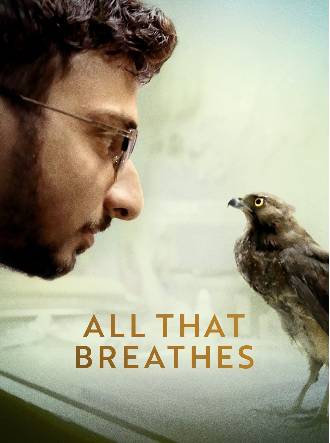
In one of the world’s most populated cities, cows, rats, monkeys, frogs, and hogs jostle cheek-by-jowl with people. Here, two brothers fall in love with a bird – the black kite. From their makeshift bird hospital in their tiny basement, the “kite brothers” care for thousands of these mesmeric creatures that drop daily from New Delhi’s smog-choked skies. As environmental toxicity and civil unrest escalate, the relationship between this Muslim family and the neglected kite forms a poetic chronicle of the city’s collapsing ecology and rising social tensions.
Director: Shaunak Sen
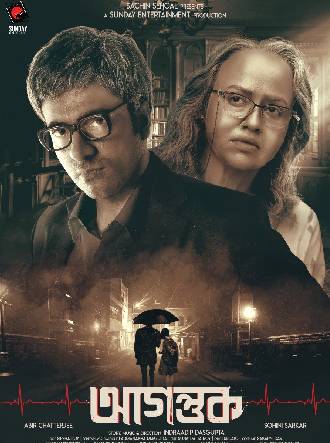
The story revolves around Mrs. Shobha Basu, our protagonist. Shobha, an irritable widow is in her 80s and leads a lonesome life, neglected by her children. She shares her house with her tenants, who too have no respect or love for her. Shobha’s mysterious sudden death shocks her tenants and even more so, as her death brings Nishith’s doppelganger to her house accompanied by a little girl. The story unfolds itself bit by bit with the help of this mysterious doppelganger and his apprentice.
Director: Indraadip Dasgupta
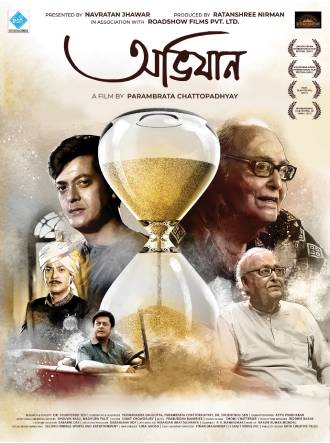
Sanjay, a london based doctor has returned to Kolkata after ages to fulfill his lifelong dream; creating a biopic of legendary actor and thespian Soumitra Chatterjee. He enlists his friend Anirban, a fellow doctor, to aid him in his quest. Despite his best attempts, he is unable to convince the legend to agree to the project.
After a devastating accident that sent his beloved nephew into a coma, Soumitra Chatterjee changes his mind; he reconnects with Sanjay to reveal the spectacular journey of his life.
Against the backdrop of creeping despair, Sanjay hears the story of a life that began in the cacophony of pre-independent Kolkata and survived the time and tides of the eras that came after. The man is witness to some of the most significant events in the country’s history; from the death of Nobel Laureate Rabindranath Tagore to the Partition which resulted in his arrival to Kolkata. He shares with Sanjay his perception of the death and suffering that was prevalent during that time.
Laced with nostalgia, he recounts his youth as a young communist party member when he spent his time embroiled in political discourse at Coffee House.
Eventually, he arrives at the point in his life where he is introduced to veteran thespian Shishir Badhuri. At the time he was at the helm of his own theatre group. Shishir Bhaduri took to mentoring a young Soumitra Chatterjee, which landed him a role in the play titled ‘Prafulla’.
Word of his talent soon found its way to Satyajit Ray’s assistant Nityanand, who was seeking a fresh face to cast in the director’s next film, ‘Aparajita’. The first meeting with the director failed to bag him the role, but not before a word of assurance.
Mr. Ray soon followed up on his promise when he offered him the role of Apu in ‘Apu’r Sangsar’, and the journey began.
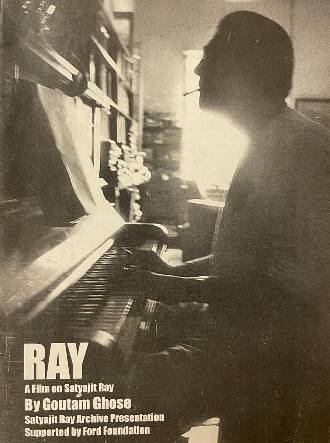
My journey into the world of Ray has been a fascinating experience all through the making of this film; it was a trip to the known, as well as into the unknown of a renaissance figure—larger than life—almost unreal in its immensity. In the age of impoverished specialisation, I have found an artist who knew too much. This experience has touched my soul and transformed my own understanding about life and art to a great extent.
Director: Goutam Ghose
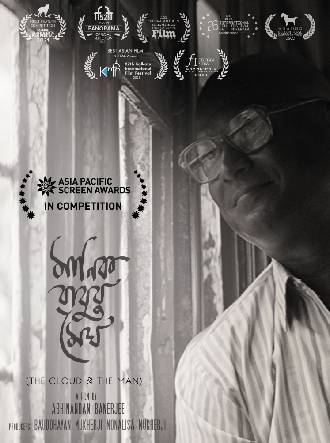
Directed by the 27-year-old debutant director Abhinandan Banerjee and produced by Buaddhayan and Monalisa Mukherji, Manik Babur Megh (The Cloud and The Man) is an unusual story of a guy called Manik who lives in the crumbling city of Kolkata. Loner by nature and asocial by choice, he lives with his ailing father who is nothing more than an alarm clock to him. Manik leads an ‘uneventful’ life which revolves around his plants, the strays he feeds, the spider, the ants and the house lizard.
Manik’s father passes away one day and Manik finds himself in a quandary. He is served a month’s notice to vacate the rented house he stays in. Just when the world around him starts falling apart, Manik meets someone that would change his life and the course of our story for good. He meets a cloud. Initially mistaking the cloud as a stalker, Manik soon discovers his folly.
What unfolds is the most unique love story the world has ever seen—The story of a cloud and a man. The surreal romance brings out a new Manik in him and propels him into a roller coaster journey of faith, betrayal, belief, and warmth.
Director: Abhinandan Banerjee
Protagonist: Chandan Sen
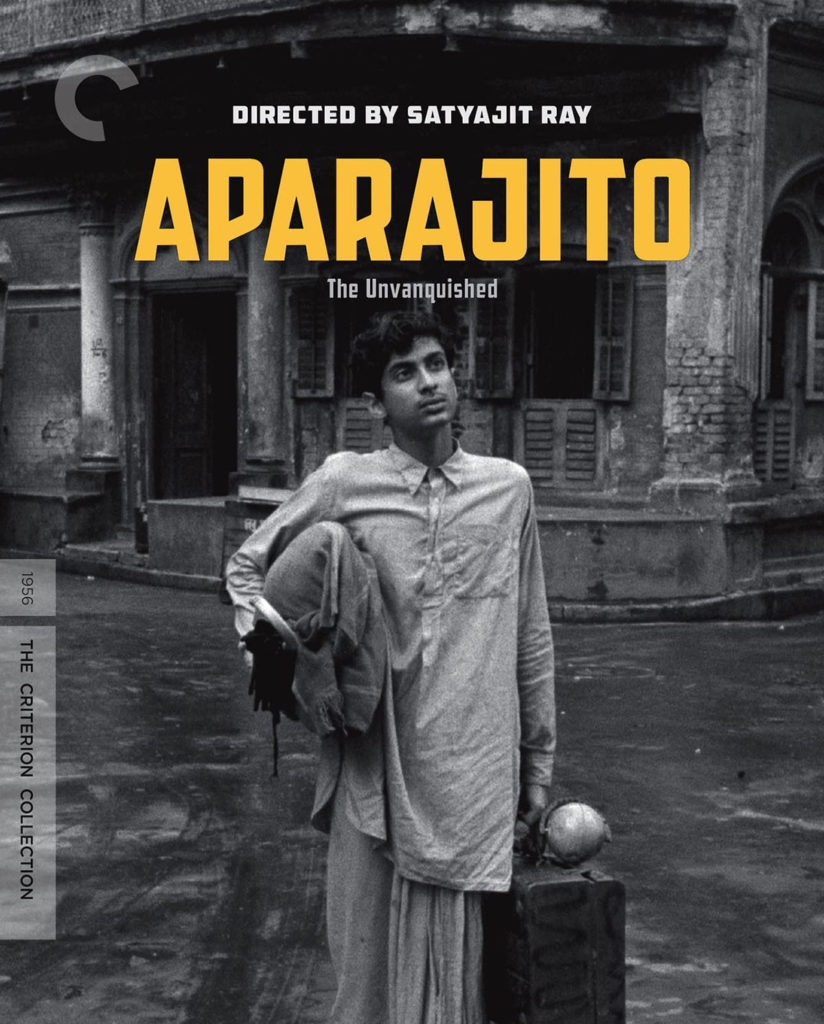
1920. Harihar, Sarbajaya and their ten-year-old son Apu, live in the Temple City of Banaras (Varanasi) on the banks of the holy river Ganga (Ganges). Harihar earns a meager living by reciting religious scriptures. The film opens with Apu wandering and exploring the city. He also encounters their neighbor Nanda Babu, who would soon make a pass at Sarbajaya.
Harihar falls ill with fever and collapses at the riverbank. In the early hours of the next morning, Sarbajaya wakes Apu to fetch holy water from the river to put in his father’s mouth as he is dying. Harihar’s death leaves mother and son to fend for themselves.
The mother decides to return with Apu to live in a village where an old uncle works as a priest. Apu’s mother works to support the family. Apu is initiated into priesthood and takes over the old man’s work. He is unhappy because he wants to go to school. Apu persuades his mother to send him to school. She makes sacrifices so that he might pursue his studies.
Apu, now sixteen, wins a scholarship and departs for Calcutta, leaving her alone. It breaks Sarbajaya’s heart, but she relents. Her health is failing, and the loneliness in the village takes its toll.
Engulfed in city life – studying during the day and working in a printing press at night to pay for his expenses – Apu grows away from his mother. His visits get shorter as the time passes. This emotional distance unnoticed by the growing Apu, hurts Sarbajaya deeply. She waits silently for her son’s visit as her illness accelerates and falls into a depression.
On a night sparkling with dancing fireflies, Sarbajaya dies. Apu comes back to an empty house. He grieves for his mother, but soon finds strength to leaves the village for the last time, to carry on with his new life in the city.
Credits |
|
| Producer: | Epic Films (Satyajit Ray) |
| Screenplay & Direction: | Satyajit Ray; based on the novel “Aparajita” by Bibhutibhushan Banerjee. |
| Cinematography: | Subrata Mitra |
| Editing: | Dulal Dutta |
| Art Direction: | Bansi Chandragupta |
| Sound: | Durgadas Mitra |
| Music: | Pandit Ravi Shankar |
| U.S. Distributor: | Merchant-Ivory/Sony Pictures Classics |
Cast |
|
| Harihar, the Father: | Kanu Banerjee |
| Sarbajaya, the Mother: | Karuna Banerjee |
| Boy Apu: | Pinaki Sen Gupta |
| Adolescent Apu: | Smaran Ghosal |
| Bhabataran, old uncle: | Ramani Sen Gupta |
| Nanda Babu: | Charaprakash Ghosh |
| Headmaster: | Subodh Ganguly |
source: SatyajitRay.org
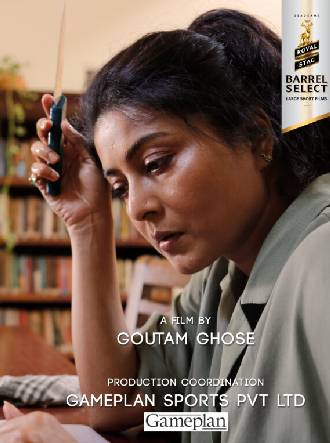
Kabir Basu—a writer in his late 40s and his wife Sumita are a happy, cultured and busy couple living in the heart of Kolkata. Like everyone else, they are caught in the claustrophobia of the Covid pandemic and the consequent lockdowns. The film travels back and forth in time as they try to navigate through these hard times and search for fresh air and sanity. The film is an exploration of their fears, realisations, and going back to nature.
Cast & Crew
Director: Goutam Ghose
Suman Mukhopadhyay
Gargee Roy Chowdhury
| BBKFF SCHEDULE | |||||
|---|---|---|---|---|---|
| Friday-2nd September | |||||
| Screen -1 | |||||
| Time | Film/Activity | ||||
| 6:00 - 8:00 PM | Inauguration Ceremony | ||||
| 8:30 - 9:30 PM | Inaugural Movie - Somoyer Smritimala | ||||
| Saturday - 3rd September | |||||
| Screen -1 | Screen -2 | ||||
| Time | Film/Activity | Time | Film/Activity | ||
| 9:00 AM | Aparajito | 9:00 AM | Manik Babur Megh | ||
| 11:30 AM | Chinnosmriti | 11:30 AM | Ray | ||
| 2:30 PM | Abhijan | 2:30 PM | Agantuk | ||
| 5:10 PM | Talk Show | 5:20 PM | All that breathes | ||
| 7:00 PM | Ananta | 7:30 PM | Dostojee | ||
| Sunday - 4th September | |||||
| Screen -1 | Screen -2 | ||||
| Time | Film/Activity | Time | Film/Activity | ||
| 9:00 AM | Sonar Kella | 9:00 AM | Jalsaghar(No subtitle) | ||
| 12:00 PM | Jhilli | 11:30 AM | Ray | ||
| 3:00 PM | Illiralaare Aklige Hoogalaaree | 1:45 PM | Jhara Palak | ||
| 6:00 PM | Mahishasur Mardini | 4:30 PM | Manik Babur Megh | ||
| 9:00 PM | Closing Ceremony | 7:00 PM | Pedro | ||


